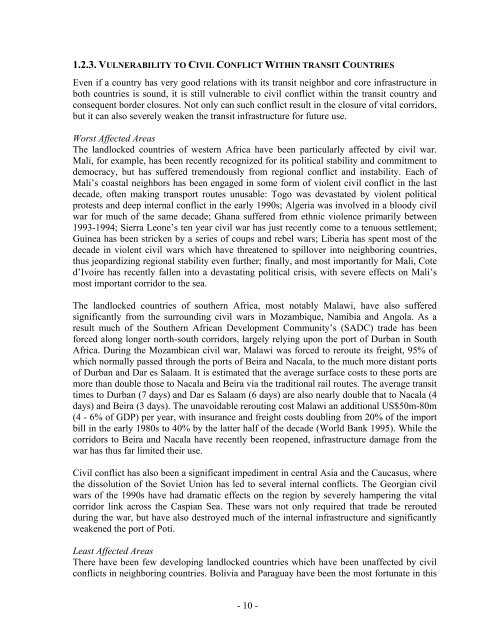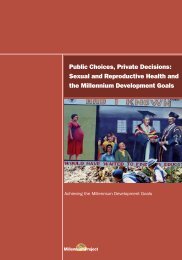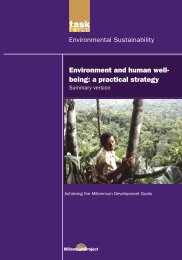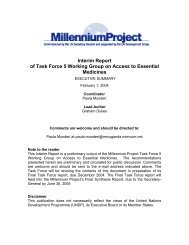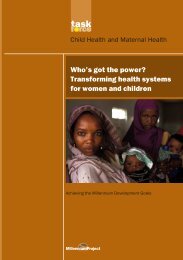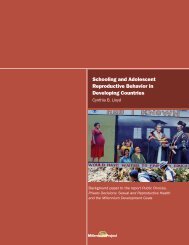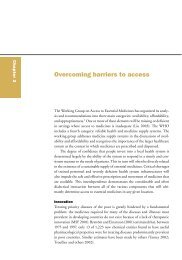the challenges facing landlocked developing countries: a case study ...
the challenges facing landlocked developing countries: a case study ...
the challenges facing landlocked developing countries: a case study ...
Create successful ePaper yourself
Turn your PDF publications into a flip-book with our unique Google optimized e-Paper software.
1.2.3. VULNERABILITY TO CIVIL CONFLICT WITHIN TRANSIT COUNTRIES<br />
Even if a country has very good relations with its transit neighbor and core infrastructure in<br />
both <strong>countries</strong> is sound, it is still vulnerable to civil conflict within <strong>the</strong> transit country and<br />
consequent border closures. Not only can such conflict result in <strong>the</strong> closure of vital corridors,<br />
but it can also severely weaken <strong>the</strong> transit infrastructure for future use.<br />
Worst Affected Areas<br />
The <strong>landlocked</strong> <strong>countries</strong> of western Africa have been particularly affected by civil war.<br />
Mali, for example, has been recently recognized for its political stability and commitment to<br />
democracy, but has suffered tremendously from regional conflict and instability. Each of<br />
Mali’s coastal neighbors has been engaged in some form of violent civil conflict in <strong>the</strong> last<br />
decade, often making transport routes unusable: Togo was devastated by violent political<br />
protests and deep internal conflict in <strong>the</strong> early 1990s; Algeria was involved in a bloody civil<br />
war for much of <strong>the</strong> same decade; Ghana suffered from ethnic violence primarily between<br />
1993-1994; Sierra Leone’s ten year civil war has just recently come to a tenuous settlement;<br />
Guinea has been stricken by a series of coups and rebel wars; Liberia has spent most of <strong>the</strong><br />
decade in violent civil wars which have threatened to spillover into neighboring <strong>countries</strong>,<br />
thus jeopardizing regional stability even fur<strong>the</strong>r; finally, and most importantly for Mali, Cote<br />
d’Ivoire has recently fallen into a devastating political crisis, with severe effects on Mali’s<br />
most important corridor to <strong>the</strong> sea.<br />
The <strong>landlocked</strong> <strong>countries</strong> of sou<strong>the</strong>rn Africa, most notably Malawi, have also suffered<br />
significantly from <strong>the</strong> surrounding civil wars in Mozambique, Namibia and Angola. As a<br />
result much of <strong>the</strong> Sou<strong>the</strong>rn African Development Community’s (SADC) trade has been<br />
forced along longer north-south corridors, largely relying upon <strong>the</strong> port of Durban in South<br />
Africa. During <strong>the</strong> Mozambican civil war, Malawi was forced to reroute its freight, 95% of<br />
which normally passed through <strong>the</strong> ports of Beira and Nacala, to <strong>the</strong> much more distant ports<br />
of Durban and Dar es Salaam. It is estimated that <strong>the</strong> average surface costs to <strong>the</strong>se ports are<br />
more than double those to Nacala and Beira via <strong>the</strong> traditional rail routes. The average transit<br />
times to Durban (7 days) and Dar es Salaam (6 days) are also nearly double that to Nacala (4<br />
days) and Beira (3 days). The unavoidable rerouting cost Malawi an additional US$50m-80m<br />
(4 - 6% of GDP) per year, with insurance and freight costs doubling from 20% of <strong>the</strong> import<br />
bill in <strong>the</strong> early 1980s to 40% by <strong>the</strong> latter half of <strong>the</strong> decade (World Bank 1995). While <strong>the</strong><br />
corridors to Beira and Nacala have recently been reopened, infrastructure damage from <strong>the</strong><br />
war has thus far limited <strong>the</strong>ir use.<br />
Civil conflict has also been a significant impediment in central Asia and <strong>the</strong> Caucasus, where<br />
<strong>the</strong> dissolution of <strong>the</strong> Soviet Union has led to several internal conflicts. The Georgian civil<br />
wars of <strong>the</strong> 1990s have had dramatic effects on <strong>the</strong> region by severely hampering <strong>the</strong> vital<br />
corridor link across <strong>the</strong> Caspian Sea. These wars not only required that trade be rerouted<br />
during <strong>the</strong> war, but have also destroyed much of <strong>the</strong> internal infrastructure and significantly<br />
weakened <strong>the</strong> port of Poti.<br />
Least Affected Areas<br />
There have been few <strong>developing</strong> <strong>landlocked</strong> <strong>countries</strong> which have been unaffected by civil<br />
conflicts in neighboring <strong>countries</strong>. Bolivia and Paraguay have been <strong>the</strong> most fortunate in this<br />
- 10 -


